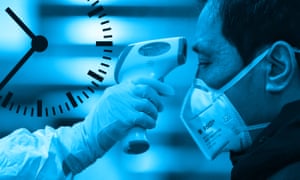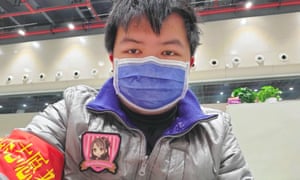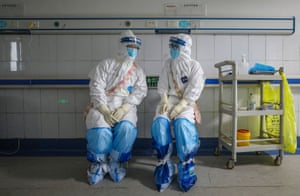My Three Weeks Suffering From Coronavirus
Tiger Ye, 21, lives in Wuhan and started showing symptoms in mid-January. Here he tells the story of his illness and recovery
On 17 January my muscles became sore all over. I may have had a slight fever, but it wasn’t strong enough to notice. Looking back, it is a little scary, because my house and the language school where I study Japanese are within a 5km radius of the Wuhan seafood market (where the virus is believed to have originated).
To treat my muscle soreness, I took some cold tablets because I thought it was a normal cold. Now that I think of it, I might have missed the best time for treatment, failing to contain the virus with antiviral drugs in its early stages.
I have no idea how I got the virus. I always eat at the same Hong Kong-style restaurant below my school. I wasn’t walking around much at the time because it was very cold, and since I was tired after classes I always went back home. Once the semester break started, I stayed with my parents and not at the dormitory. I started wearing a mask a few days later when I saw everyone else around me wearing masks.
Sickness and self-isolation
By 21 January my body was still aching all over, so I called my dad. He sensed something was wrong with me and urged me to go home immediately. That evening I took my body temperature which showed a mild fever. My mom said that if my temperature still didn’t drop later that night, we would go to the hospital. At 11pm that night, the fever hadn’t gone away, so I went to Tongji hospital.
On arrival I saw the hospital already overwhelmed with patients. Seeing doctors in their hazmat suits in real life for the first time, something I’d only seen in documentaries about Sars, I realised something bad was happening.
I wasn’t that astonished or scared when I saw all the people, because it is one of the best hospitals in Wuhan and it is always very crowded. Because of the massive crowds, I decided to go to Wuhan pulmonary hospital instead, and that proved to be the right decision.
There was not a single patient there at the time I arrived. There I had blood and liver function [tests] and a CT scan. The CT results came back showing patchy shadows on the lower sides of both of my lungs. I started to take some prescription medicine and Chinese medicine capsules prescribed by the hospital.
When Wuhan started to be locked down, that’s when my dad had me quarantine myself at home. I also knew from watching movies and things that we should probably stock up on food at home, so we bought a bunch of instant noodles, which no one ended up eating. There was enough at the supermarket; the only thing we really couldn’t find was disinfectants.
My father is an office worker at a drug company and my mom went to school at a medical university, so they were good with helping analyse my situation. I started to self-isolate on 22 January. My room has its own tub and bathroom, so it is pretty convenient. My grandma did the cooking for me and when she brought food in, she would wear a mask and we’d use disposable chopsticks and things like that, so after I was done that all got thrown out.
‘The worst time’
On 25 January I had a checkup. I had begun to cough. It was a very dry cough with a little yellow phlegm. The results showed that my situation was worsening, with the infection spreading to my entire lungs. The doctor gave me an IV drip, while the oral medicine remained the same. At the time the doctor told me I was suspected of having the virus, but that only an expert committee could decide who would be able to use the testing kit.
By 26 January getting up had become extremely difficult and I was shivering with cold. I felt I was having a high fever, and I was: 39C. Reports later said that the situation could develop extremely fast in the middle stage, but before I knew it, by that evening the fever was gone. It felt like having been to hell and back. That period from 21 January to the 26th was the worst time. I coughed so bad my stomach was hurting and my back ached. Those were some of the worst days in my life.
It was then that I realised I needed some spiritual support or maybe I couldn’t make it. So I watched my favourite anime show and seeing their normal, happy lives, I thought I may have to say goodbye to this life forever. But watching the show, the heroine had troubles in the first half, but she finally made it and succeeded in her career.
You see, I was going to fly to Japan in mid-February to go to a concert by Ayaka Ohashi, a Japanese voice actress and anime artist, but with the lockdown I thought everything might be cancelled. I had attended her solo performance last year, and after watching her I had decided I wanted to make a career out of managing voice actors. So watching the show, I thought: I must make it if I want to see her next concert alive. This really encouraged me and gave me some relief, along with the medicine. I dreamed twice that week that I met her.
I had another re-exam on 28 January, which showed both my lungs were getting better. After a medical consultation between the doctors, they decided I was qualified for being tested for the coronavirus.
The virus spreads
My elder brother began to have a fever and cough on the 29th. His exam results showed there were small patches of glass-like shadows in his lungs. He was considered a suspected case. On the same day, my grandma also had a fever. As for me, my test results were positive and I was officially a confirmed case. The hospital gave me five days of an anti-HIV medicine for free, while my family were also starting to take prescribed medicine. Due to my improved situation and limited beds in the hospital, I was told to go home and isolate myself, and thus my IV therapy ended.
Photograph: Reuters
My brother had a re-exam and he tested positive on 2 February. My grandmother had a fever for four days but then recovered. She was never tested, and neither was my mother, but they all took medicine. My brother also eventually recovered and is now negative for the virus.
On 4 February, a CT scan showed continued improvements in my lungs, and my cough stopped. I was given another coronavirus test and prescribed more medicine. The next day test results showed I was negative for the virus, but according to instructions from the doctors, I needed to go back for another test. On 7 February results showed again that I was negative, and I was declared recovered.
- As told to Michael Standaert
How the coronavirus affects people
Most cases are mild, but the new virus is proving lethal to some
Feb. 19, 2020 at 1:30 p.m. EST
While the virus attacks and kills cells in all cases, serious illness will depend on how the immune system responds, and that can be influenced by age, gender, genetics and underlying medical conditions. The initial damage caused by the virus can trigger a powerful and counterproductive overreaction by the immune system itself.
“What you get is the initial damage and rush of inflammatory cells, but the damage is so extensive that the body’s immune response is completely overwhelmed — which causes even more immune response, more immune cells and more damage,” said Matthew Frieman, a virologist at the University of Maryland School of Medicine.
The coronavirus is spread when an infected person sneezes or coughs, spraying droplets through the air. The sick person might sneeze directly in another person’s face or expel droplets widely, contaminating surfaces that healthy people touch before unknowingly spreading germs to their mouths or noses. Health-care workers are at especially high risk because they are exposed to very high doses of the virus and also perform procedures — such as putting patients on ventilators to help them breathe — that can spread it.
With infection, the virus probably begins to multiply inside cells lining the airway, which are fringed with hairlike structures. Coronaviruses that cause common colds are excellent at infecting the upper airway, while SARS tended to go deeper in the lungs. As the coronavirus gains strength, Frieman said, dead cells are sloughed off and collect in the airway, making breathing difficult.
“If the virus replicates very quickly, before your body has a chance to try and prevent it with an immune response, or if the immune response comes in too late, then it can’t control the virus and starts going berserk,” said Anthony Fehr, a virologist at the University of Kansas.
This is what scientists refer to as a “cytokine storm,” which causes the immune system to start sending cells ready to do battle into the lung. At that point, it’s not just the virus doing damage to the body; the immune system begins wreaking havoc on the infected person — also known as the “host” in medical parlance.
“The experience with other respiratory viruses would suggest it is a combination of the virus doing damage to the airways, secondary infections and the interplay with the host immune response,” said Erica S. Shenoy, an infectious diseases specialist at Massachusetts General Hospital.
The general risk factors for this mismatch between the immune system and any respiratory illness include advanced age and underlying chronic illnesses, including diabetes and high blood pressure, though public health experts are eager to understand more about who is most vulnerable in the current outbreak.
“Every individual is different,” Fehr said, and there are differences in how young and old or male and female immune systems react. “There are lots of dynamics at play when you talk about each individual and how they might die from this virus or why they might survive.”
Problems can also stack up. Vineet Menachery, a virologist at the University of Texas Medical Branch, suspects that the coronavirus may work much like SARS. When the virus gets deep into the lungs, it can damage alveoli, the air sacs that take in oxygen. As cellular damage accumulates, lung tissue begins to stiffen. The heart must work harder to get limited oxygen to the rest of the organs.
“What makes this new virus so damaging is you’re losing lung function, and that puts a strain on every organ in your body,” Menachery said.
In the patients who recover, the immune system’s response has worked: It has cleared the virus, with inflammation receding. Yet experts don’t know the long-term outcome for these individuals. It’s possible they will gain immunity and be protected from reinfection. Or they might get a less severe case in the future — or not be protected at all. They also might just gain temporary immunity. It’s yet another unanswered question about the coronavirus.





